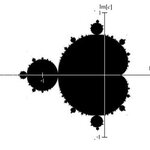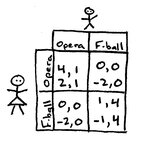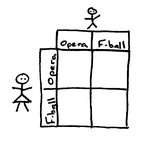
Yesterday, I posted Game Theory's El Farol Bar problem, with a couple questions. (If you haven't read it yet, go back—the answer's no good without the puzzle.) And the truth is there's no answer, or more precisely, there's no pure strategy that works—if everyone decides to go, the bar's too crowded and it's no fun; if everyone decides to stay home, the bar will be empty and it would've been more fun to go.
And so the best strategy is a mixed strategy in which each person has a set probability of going. The probability depends on how many people are deciding, the capacity of the bar, and how…





